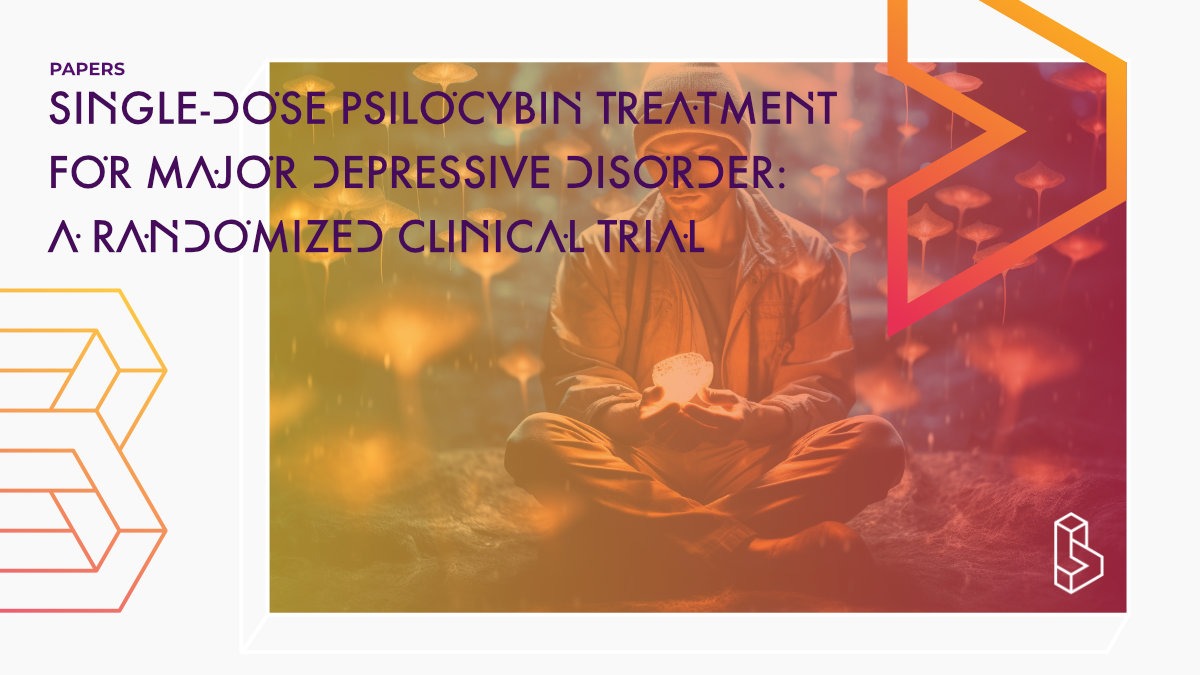This Phase II trial (n=104) evaluated the effects of a single dose of psilocybin (25mg) vs niacin (100mg) placebo in adults with moderate or severe depression (MDD). Psilocybin treatment significantly reduced depression scores (MADRS & Sheehan Disability Scale) compared to niacin up to day 43. While there were no serious treatment-emergent adverse events, psilocybin was associated with a higher rate of overall and severe adverse events.
Abstract of Single-Dose Psilocybin Treatment for Major Depressive Disorder: A Randomized Clinical Trial
“Objective: To evaluate the magnitude, timing, and durability of antidepressant effects and safety of a single dose of psilocybin in patients with MDD.
Design, setting, and participants: In this phase 2 trial conducted between December 2019 and June 2022 at 11 research sites in the US, participants were randomized in a 1:1 ratio to receive a single dose of psilocybin vs niacin placebo administered with psychological support. Participants were adults aged 21 to 65 years with a Diagnostic and Statistical Manual of Mental Disorders, Fifth Edition diagnosis of MDD of at least 60 days’ duration and moderate or greater symptom severity. Exclusion criteria included history of psychosis or mania, active substance use disorder, and active suicidal ideation with intent. Participants taking psychotropic agents who otherwise met inclusion/exclusion criteria were eligible following medication taper. Primary and secondary outcomes and adverse events (AEs) were assessed at baseline (conducted within 7 days before dosing) and at 2, 8, 15, 29, and 43 days after dosing.
Interventions: Interventions were a 25-mg dose of synthetic psilocybin or a 100-mg dose of niacin in identical-appearing capsules, each administered with psychological support.
Main outcomes and measures: The primary outcome was change in central rater-assessed Montgomery-Asberg Depression Rating Scale (MADRS) score (range, 0-60; higher scores indicate more severe depression) from baseline to day 43. The key secondary outcome measure was change in MADRS score from baseline to day 8. Other secondary outcomes were change in Sheehan Disability Scale score from baseline to day 43 and MADRS-defined sustained response and remission. Participants, study site personnel, study sponsor, outcome assessors (raters), and statisticians were blinded to treatment assignment.
Results: A total of 104 participants (mean [SD] age, 41.1 [11.3] years; 52 [50%] women) were randomized (51 to the psilocybin group and 53 to the niacin group). Psilocybin treatment was associated with significantly reduced MADRS scores compared with niacin from baseline to day 43 (mean difference,-12.3 [95% CI, -17.5 to -7.2]; P <.001) and from baseline to day 8 (mean difference, -12.0 [95% CI, -16.6 to -7.4]; P < .001). Psilocybin treatment was also associated with significantly reduced Sheehan Disability Scale scores compared with niacin (mean difference, -2.31 [95% CI, 3.50-1.11]; P < .001) from baseline to day 43. More participants receiving psilocybin had sustained response (but not remission) than those receiving niacin. There were no serious treatment-emergent AEs; however, psilocybin treatment was associated with a higher rate of overall AEs and a higher rate of severe AEs.“
Authors: Charles L. Raison, Gerard Sanacora, Joshua Woolley, Keith Heinzerling, Boadie W. Dunlop, Randall T. Brown, Rishi Kakar, Michael Hassman, Rupal P. Trivedi, Reid Robison, Natalie Gukasyan, Sandeep M. Nayak, Xiaojue Hu, Kelley C. O’Donnell, Benjamin Kelmendi, Jordan Sloshower, Andrew D. Penn, Ellen Bradley, Daniel F. Kelly, Tanja Mletzko, Christopher R. Nicholas, Paul R. Hutson, Gary Tarpley, Malynn Utzinger, Kelsey Lenoch, Kasia Warchol, Theraysa Gapasin, Mike C. Davis, Courtney Nelson-Douthit, Steffanie Wilson, Carrie Brown, William Linton, Stephen Ross & Roland R. Griffiths
Summary of Single-Dose Psilocybin Treatment for Major Depressive Disorder: A Randomized Clinical Trial
Recent studies suggest that psilocybin can help treat major depressive disorder, but many of these studies have limitations, such as small sample sizes and open comparator designs. The current study addressed these issues using a randomized, multiblinded design.
Study Design Overview and Oversight
This randomized, 2-group, phase 2 clinical trial was conducted at 11 US sites from December 2019 to June 2022 to evaluate the efficacy of psilocybin vs niacin administered with psychological support in patients with MDD.
Find this paper
Single-Dose Psilocybin Treatment for Major Depressive Disorder: A Randomized Clinical Trial
https://pubmed.ncbi.nlm.nih.gov/37651119/
Paywall | Google Scholar | Backup | 🕊
Cite this paper (APA)
Raison, C. L., Sanacora, G., Woolley, J. et al. Single-Dose Psilocybin Treatment for Major Depressive Disorder: A Randomized Clinical Trial. JAMA. doi:10.1001/jama.2023.14530
Study details
Compounds studied
Psilocybin
Topics studied
Depression
Study characteristics
Original
Placebo-Controlled
Active Placebo
Double-Blind
Randomized
Participants
104
Humans
Authors
Authors associated with this publication with profiles on Blossom
Charles RaisonCharles "Chuck" L. Raison is an American psychiatrist and professor of psychiatry. Next to his academic affiliation, he is also affiliated with the Usona Institute.
Roland Griffiths
Roland R. Griffiths is one of the strongest voices in psychedelics research. With over 400 journal articles under his belt and as one of the first researchers in the psychedelics renaissance, he has been a vital part of the research community.
Institutes
Institutes associated with this publication
Usona InstituteThe Usona Institute was founded by Bill Linton and Malynn Utzinger. Currently, 18 people are associated with it. The institute is a non-profit that sponsors psilocybin research (and is funded by sponsors/philanthropists).
Compound Details
The psychedelics given at which dose and how many times
Psilocybin 25 mg | 1xLinked Clinical Trial
A Study of Psilocybin for Major Depressive Disorder (MDD)The purpose of this study is to evaluate the potential efficacy of a single 25 mg oral dose of psilocybin for MDD compared to the active placebo in otherwise medically-healthy participants, assessed as the difference between groups in changes in depressive symptoms from Baseline to Day 43 post-dose.

